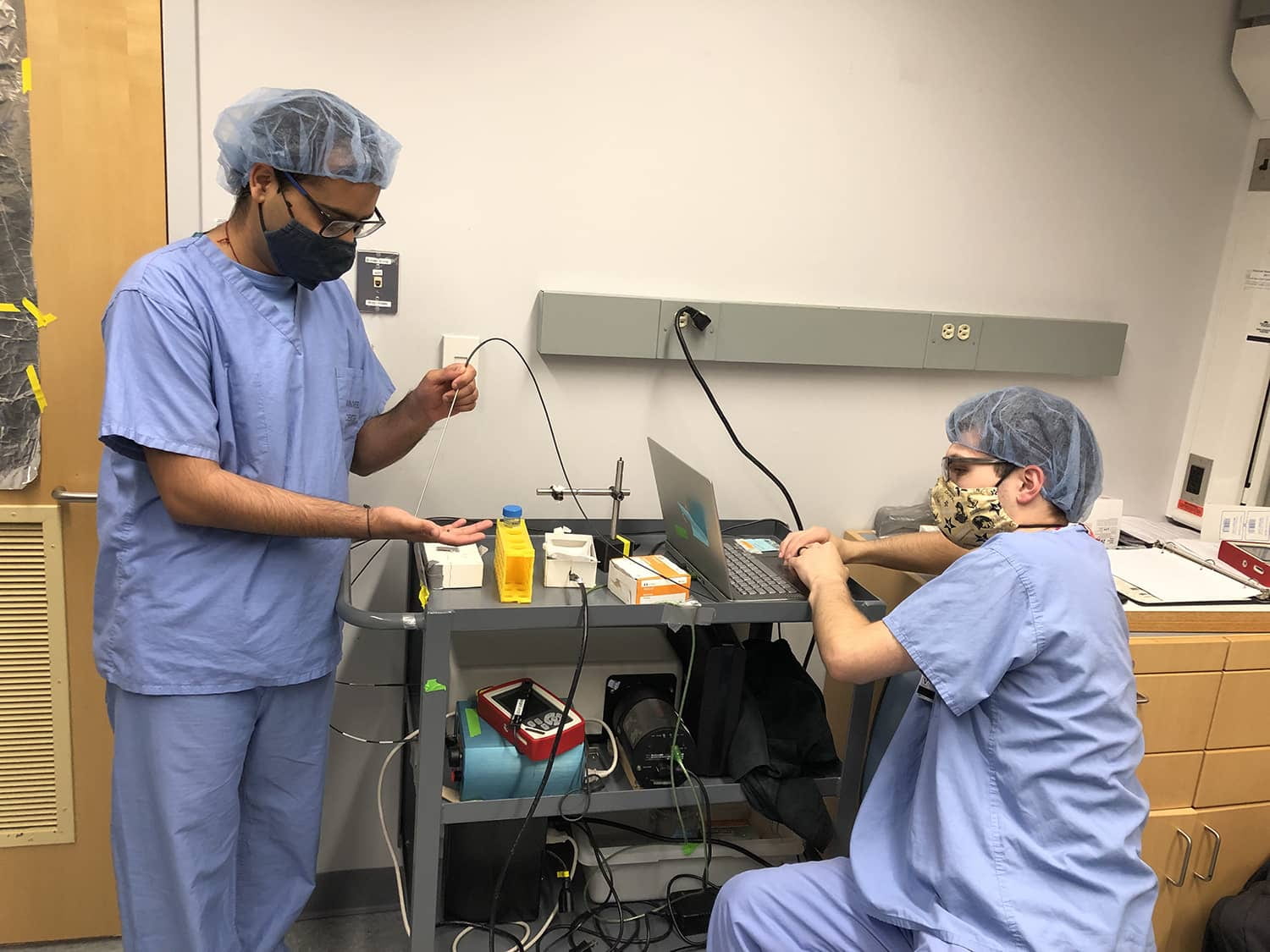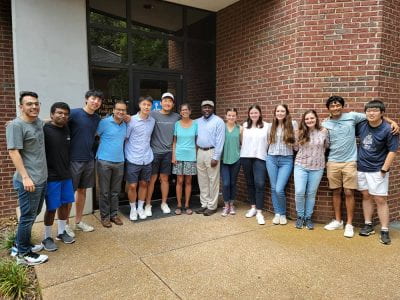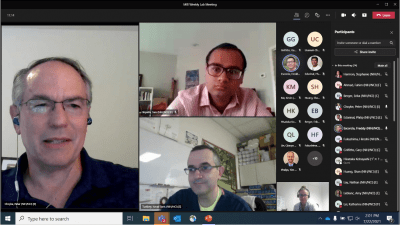
Sani (left), along with Parker Willmon, a Vanderbilt Biomedical Engineering PhD student, test the Raman system prior to taking it to the operating room.
Sani Tripathi is a honors biomedical engineering senior from Conway, Arkansas. This past summer Sani received offers to participate in two research experiences for undergraduates (REUs): the Vanderbilt Biophotonics Center Summer Research Program (in Nashville) and the NIH Summer Internship Program in Biomedical Research (online). Thanks to careful time management and some late-night data mining, he managed to do both — and even managed to schedule some fun downtime with friends.
Ever since I was introduced to medical research in high school, I was hooked. Working in the lab on various projects has pushed me to apply concepts learned in the classroom as well as learn new things to aid in my studies Through opportunities and advice from the Honors College and faculty in the Department of Biomedical Engineering, I have been able to pursue research in places that I could only dream of, such as the Yale School of Medicine and the University of California, San Diego, in past summers.
During the Spring 2021 semester, through countless nights of searching for possible internships, I finalized a list of programs to apply to for the summer and prepared all essays/application materials in a timely manner. At the end of the application process, I received mixed results: Some programs rejected me but others did not. Out of all the offers I received, I ultimately chose to spend 10 weeks in Nashville, Tenn., taking part in the Vanderbilt Biophotonics Center Summer Research Program, which I was so excited about. A couple of weeks later I received news that another internship that I was selected for in Summer 2020, the NIH Summer Internship Program in Biomedical Research, was offering me a position since it was cancelled last year due to COVID-19. Unlike the Vanderbilt research program, which was set to be fully in-person, the NIH research program was going to be completely virtual. When receiving news about my deferred offer, I was speechless and at the same time uncertain since I was not sure if I should choose one offer over the other or simply challenge myself to complete both. I elected to complete both research opportunities knowing that in the summer, it would be crucial for me to be extremely time-efficient and to get meaningful results.

Interns at the 2021 Vanderbilt Biophotonics Center Summer Research Program. Sani is fourth from left in this photo.
Vanderbilt BIophotonics Center Summer Research Program
I arrived in Nashville in the first week of June and was introduced to all of my mentors at the Vanderbilt Biophotonics Center (VBC). I was selected to work in the lab of Dr. Anita Mahadevan-Jansen, whose research focuses on using optical techniques such as Raman and fluorescence spectroscopy for clinical diagnosis and surgical guidance. After meeting her for the first time, she introduced me to members of her team including her graduate students and postdocs. Once introduced to the people who I would be working with closely (Dr. Giju Thomas and Sean T. Fitzgerald), I began work on my project, which dealt with using Raman spectroscopy to examine Oropharyngeal cancer (OPC) tissue specimens. OPC, which refers to cancers of the back of the throat, including the base of the tongue and tonsils, has had a rapid incidence in recent decades (increased by 225%) and is expected to affect 54,000 Americans this year. The goal of my project was to determine if a non-invasive, cost-effective technique such as Raman spectroscopy could serve a viable tool to detect OPC, which could lead to better screening and prognosis for patients. Although I had some background in using the technology from my research here at the U of A in Dr. Narasimhan Rajaram’s lab, I still learned new ways/applications to using this technique. I was at ease there knowing that my background in college prepared me well. Over the course of 10 weeks, I was able to collect and analyze all of my data and was able to submit an abstract to SPIE Photonics West 2022, the world’s largest photonics conference, to be held in San Francisco in late January 2022. If selected, I hope to attend the conference to present my work as well as interact with other prominent figures in the area of biomedical optics.
Due to expressing my interest in translational research to my mentors, I was also provided an opportunity to observe patient cases at Vanderbilt University Medical Center, where I saw first-hand how physicians used optical technologies developed at the VBC to take measurements on cancerous tissue. Every week I also took part in lab, center and professional development series meetings where we learned about graduate school applications, industry opportunities and fellowships to apply to such as the National Science Foundation’s Graduate Research Fellowships Program. Finally, I was able to explore Nashville and its notable attractions as well as visit Atlanta one weekend with the other interns in my program.

Sani participates in an online meeting and presentations with members of the National Cancer Institute’s Artificial Intelligence Resource (AIR) group.
NIH Summer Internship Program in Biomedical Research
My second internship for the NIH was completely virtual and took place in the same weeks as my other internship (beginning of June to beginning of August). Although the dates overlapped, I tried my very best to dedicate equal time to both projects during the day. Sometimes this meant getting up early or staying up late at night to get data. For my research, I was selected to work for the Artificial Intelligence Resource (AIR) group which is affiliated with the National Cancer Institute. Drs. Stephanie Harmon, Baris Turkbey, and Freddy E. Escorcia served as my mentors this summer and guided me through any hurdles I encountered.
The project assigned to me dealt with prostate cancer detection from digital pathology. Prostate cancer is the second most common cancer among men (4th most common overall). This year approximately 248,000 people will be affected by this disease, and it has been a major focus in research in recent years. Specifically, I utilized deep learning algorithms to both detect and grade areas of cancer from patients who underwent radical prostatectomy. Due to the fact that I was completing my work virtually, this posed certain challenges. Much of the laboratory testing I was set to perform was not able to take place hence all my work was computational based. In June, I received pathology slide images from 116 patients, which I analyzed using the existing deep learning tools the AIR group had been applying to various other diseases. Over the course of two months, I was able to perform critical tests on the large data set given to me and analyze the results in different contexts. After completing that project, I was able to present my work to the AIR group as well as to the broader NIH community at the NIH Summer Research Presentation Week.
All in all, I am thankful and humbled to have taken part in both experiences as it strengthened my scientific skillset and helped me gain meaningful relationships that will last a lifetime. I also would like to express my sincerest gratitude to all of my mentors who have supported me: Drs. Narasimhan Rajaram (UARK), Lloyd G. Cantley (Yale), Anita Mahadevan-Jansen (Vanderbilt), Freddy E. Escorcia (NIH), Patrycja A. Krakowiak (ASMSA), and many more! I would not be where I am without them. This fall, I am applying to various Ph.D. programs in biomedical engineering and aim to do research in the area of biphotonics. To all the students, wishing to pursue REUs and other internships, never be afraid to apply. Have a plan and great support system around you and you can go places you have never gone.
